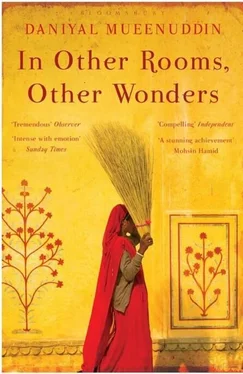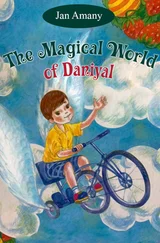The clinic smelled of disinfectant and of bodily fluids, a heavy sweetish odor. Four beds stood in a room, dimly lit by a fluorescent tube. As they carried him in, Nawab, alert to the point of strain, observed the blood on some rumpled sheets, a rusty blot. The pharmacist, who lived above his clinic, had come down wearing a loincloth and undershirt. He seemed perfectly calm and even cross at having been disturbed.
‘Put them on those two beds.’
‘ As-salaam uleikum, Doctor Sahib,’ said Nawab, who felt as if he were speaking to someone very far away. The pharmacist seemed an immensely grave and important man, and Nawab spoke to him formally.
‘What happened, Nawab?’
‘He tried to snatch my motorbike, but I didn’t let him.’
The pharmacist pulled off Nawab’s shalvar, got a rag, and washed away the blood, then poked around quite roughly, while Nawab held the sides of the bed and willed himself not to scream. ‘You’ll live,’ he said. ‘You’re a lucky man. The bullets all went low.’
‘Did it hit …’
The pharmacist dabbed with the rag. ‘Not even that, thank God.’
The robber must have been hit in the lung, for he kept breathing up blood.
‘You won’t need to bother taking this one to the police,’ said the pharmacist. ‘He’s a dead man.’
‘Please,’ begged the robber, trying to raise himself up. ‘Have mercy, save me. I’m a human being also.’
The pharmacist went into the office next door and wrote out the names of drugs on a pad, sending the two villagers to a dispenser in the next street.
‘Tell him it’s Nawabdin the electrician. Tell him I’ll make sure he gets the money.’
Nawab for the first time looked over at the robber. There was blood on his pillow, and he kept snuffling, as if he needed to blow his nose. His thin and very long neck hung crookedly on his shoulder, as if out of joint. He was older than Nawab had thought before, not a boy, dark-skinned, with sunken eyes and protruding yellow smoker’s teeth, which showed whenever he twitched for breath.
‘I did you wrong,’ said the robber weakly. ‘I know that. You don’t know my life, just as I don’t know yours. Even I don’t know what brought me here. Maybe you’re a poor man, but I’m much poorer than you. My mother is old and blind, in the slums outside Multan. Make them fix me, ask them to and they’ll do it.’ He began to cry, not wiping the tears, which drew lines on his dark face.
‘Go to hell,’ said Nawab, turning away. ‘Men like you are good at confessions. My children would have begged in the streets.’
The robber lay heaving, moving his fingers by his sides. The pharmacist seemed to have gone away somewhere, leaving them alone.
‘They just said that I’m dying. Forgive me for what I did. I was brought up with kicks and slaps and never enough to eat. I’ve never had anything of my own, no land, no house, no wife, no money, never, nothing. I slept for years on the railway station platform in Multan. My mother’s blessing on you. Give me your blessing, don’t let me die unforgiven.’ He began snuffling and coughing even more, and then started hiccupping.
Now the disinfectant smelled strong and good to Nawab. The floor seemed to shine. The world around him expanded.
‘Never. I won’t forgive you. You had your life, I had mine. At every step of the road I went the right way and you the wrong. Look at you now, with bubbles of blood stuck in the corner of your mouth. Do you think this isn’t a judgment? My wife and children would have begged in the street, and you would have sold my motorbike to pay for six unlucky hands of cards and a few bottles of poison home brew. If you weren’t lying here now, you would already be in one of the gambling camps along the river.’
The man said, ‘Please, please, please,’ more softly each time, and then he stared up at the ceiling. ‘It’s not true,’ he whispered. After a few minutes he convulsed and died. The pharmacist, who had come in by then and was cleaning Nawab’s wounds, did nothing to help him.
Yet Nawab’s mind caught at this, looking at the man’s words and his death, like a bird hopping around some bright object, meaning to peck at it. And then he didn’t. He thought of the motorcycle, saved, and the glory of saving it. He was growing. Six shots, six coins thrown down, six chances, and not one of them killed him, not Nawabdin Electrician.
SALEEMA WAS BORN in the Jhulan clan, blackmailers and bootleggers, Muslim refugees at Partition from the country northwest of Delhi. They were lucky, the new border lay only thirty or forty miles distant, and from thieving expeditions they knew how to travel unobserved along canals and tracks. Skirting the edge of the Cholistan Desert, crossing into Pakistan, on the fourth night they came to a Hindu village abandoned by all but a few old women. They drove them away and occupied the houses, finding pots and pans, buckets, even guard dogs, which grew accustomed to them. During Saleema’s childhood twenty years later the village was gradually being absorbed into the slums cast off by an adjacent provincial town called Kotla Sardar. Her father became a heroin addict, and died of it, her mother slept around for money and favors, and she herself at fourteen became the plaything of a small landowner’s son. Then a suitor appeared, strutting the village on leave from his job in the city, and plucked her off to Lahore. He looked so slim and city-bright, and soon proved to be not only weak but depraved. These experiences had not cracked her hard skin, but made her sensual, unscrupulous — and romantic.
One morning she lay on the bed of the cramped servants’ quarters in Lahore where she and her husband lived. He was gone for the day, aimless and sloping around the streets, unwanted at the edge of the crowd in a tea stall. Though he knew right away that she slept with Hassan the cook, in this house where she served as a maid, the first time he opened his mouth she made to slap him and pushed him out of the room; and next day as usual he hungrily took the few rupees she gave — to buy twists of rocket pills, his amphetamine addiction.
She picked at the chipped polish on her long slim toe, feeling sorry for herself. Her oval face, taller than broad, with deep-set eyes, had a grace contrasting with her bright easy temperament. At twenty-four this hard life had not yet marked her, and when she smiled her dimples made her seem even younger, just a girl; she still had some of the girl’s gravity. It was true, the cook Hassan had gotten everything from her, as always she’d given it too soon. She had been a maidservant in three houses so far, since her husband lost his job as peon in an office, and in every one she had opened her legs for the cook. She’d been here at Gulfishan, the Lahore mansion of the landlord K. K. Harouni, only a month, and already she’d slept with Hassan. The cooks tempted her, lording it over the kitchen, where she liked to sit, with the smell of broth and green vegetables cooking and sauce. And she had duties in the kitchen, she made the chapattis , so thin and light that they almost floated up to the ceiling. She had that in her hands. Mr. Harouni had called her into the dining room at lunch one day and said he’d never in seventy years eaten better ones, while she blushed and looked at her bare feet. And then, the delicacies that Hassan gave her — the best parts, things that should have gone to the table, foreign things, pistachio ice cream and slices of sweet pies, baked tomatoes stuffed with cheese, potato cutlets. Things that she asked for, village food, curry with marrow bones and carrot halva .
The entire household, from the Sahib on down, had been eating to suit her appetite.
Читать дальше












